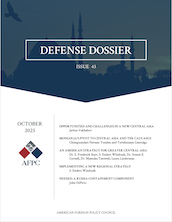The US returns to region between Russia, China and Iran
Trump Route for International Peace and Prosperity will link Turkey and the West
Trump Route for International Peace and Prosperity will link Turkey and the West
Almost four years into Russia’s war in Ukraine, and more than a decade after Russia’s annexation of Crimea, the U.S. is faced with a dilemma. On the one hand is the urge to continue to support Ukraine diplomatically and militarily. On the other is the push to stop a war that neither side can win.
In October 2025, the Organization of Turkic States (OTS) convened a pivotal summit in Gabala, Azerbaijan, demonstrating its emergence as a significant geopolitical entity on the Eurasian landscape.

Opportunities and Challenges in A New Central Asia
Mongolia’s Pivot to Central Asia and the Caucasus
An American Strategy for Greater Central Asia
Implementing A New Regional Strategy
Needed: A Russia Containment Component
-2.jpg)
The outcome of the Second Karabakh War is a watershed event in the modern history of Eurasia. It represents the moment of conception of a new South Caucasus, the only part of the world that borders on Russia, Turkey, and Iran. Unsurprisingly, external powers like the U.S., China, the EU, India, and the GCC states are all taking greater interest in its future.